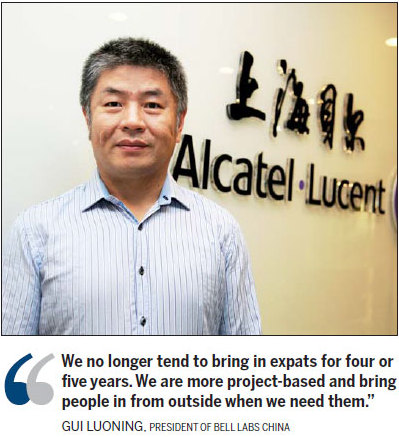New home of R&D


Incubator of seven nobel prizes now has a perfect base in China
China is now the research and development center for many foreign multinationals, the head of a leading technology company in the country says.
Gui Luoning, president of Bell Labs China, based in Shanghai, says the overall figures on research and development spending in China understate its actual strength.
"I think the main focus of many multinationals is to spend money on research and development in China, and it is a growing trend," he says.
"You might not have the people with skills you don't see elsewhere, but you are in a place where you have problems you want to solve and develop the technology for."
Bell Labs, part of the French telecommunications giant Alcatel-Lucent, employs 100 scientists, working on the future of wireless technology and ultra broadband.
The company's labs in Shanghai were responsible for a large proportion of the 3,000 patents the company filed last year. It has other bases in the US, Belgium, France, Germany, Ireland and South Korea.
Gui, who has been with the company since 1996, says there is no doubt about the importance of the market when clients such as China Mobile has 600 million subscribers, more than any other phone company in the world. Bell also works with China Unicom and China Telecom.
"If you are talking about China Mobile moving into cloud computing, you have the numbers of customers you would not find anywhere else in the world.
"We have an understanding of the issues of these companies and some of the best thinkers and minds in the world."
Bell Labs, set up in 1925 and which invented the transistor and the laser and has shared in seven Nobel prizes, recruits the majority of its staff from China.
"Most of our staff are Chinese and 100 percent of them have PhDs from not only the top universities in China but also from the United States and Britain and elsewhere.
"We no longer tend to bring in expats for four or five years. We are more project-based and bring people in from outside when we need them."
Gui says it is no longer important where research and development scientists are actually based.
"You can walk into rooms in our offices and be instantly connected with colleagues from the rest of the world as if they were right there. It is easy now to discuss a particular topic with a colleague in Germany or the United States."
Gui believes the issues surrounding intellectual property protection in China are often exaggerated.
"When China was first developing, people didn't have any idea of what intellectual property was. It was just natural to copy and follow others. I think there is now a gradual realization that it is critical and will not be so much an issue in the future."
(China Daily Africa Weekly 07/11/2014 page16)
Today's Top News
- Thailand and Cambodia agree to temporary ceasefire
- NPC's 4th annual session slated for early March
- Civilizational links for a fairer world
- Manufacturing in China spurs global growth
- Taiwan lawmakers vote to pass motion to impeach Lai
- Xi: Steadfastly implement conduct rules






























